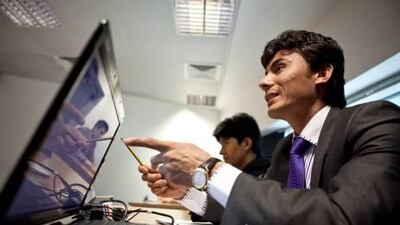ABU DHABI // Thirteen future ambassadors of war-torn Afghanistan have completed a month-long mission of intense training at the capital's diplomatic academy.
The 11 men and two women have been studying at Zayed University, learning about the world beyond their own.
The students, who work for Afghanistan's Ministry of Foreign Affairs, are part of a humanitarian initiative from the UAE's own Ministry of Foreign Affairs.
The scheme benefited both sides, said the academy head, Dr Federico Velez. It exposes the students to a new country and gives the academy's staff a more enriching, rewarding experience.
"You really feel like you're contributing to the redevelopment and peace of their country," he said. "You see these guys and feel there's hope for Afghanistan."
Many, such as Hakim Sadiki, 27, had barely left Kabul before, and were eager to open their eyes to what was outside. Mr Sadiki had been only to India and Pakistan, both trips for training with the ministry.
He was born in Ogar province, outside Kabul, and his family moved to the capital after Hamid Karzai came to power, as the security situation deteriorated.
He has come up through the ranks, beginning as an English teacher at the ministry, before being taken on in the diplomatic field.
"Very few people had been listening to BBC and CNN coverage of what was going on in Afghanistan," he said, "but I did, and found out the diplomacy of Afghanistan was very weak. This was a big factor in making me want to do something for my country."
He said the image of the country was one of fighting, poverty and lacking human rights but there was hope and a young generation that wanted to make big changes.
The UAE, with its many nationalities co-existing, has been an eye-opener for many of the students.
Dr Velez explained: "We wanted to give them the chance to see a Muslim country that's open to modernity, and yet teach them about its culture, the language and the history. Now, they've realised that it's possible to have modernity without compromising your values ... it was important for them to be here, at a women's university, and interact with Emiratis."
By the time they leave on Tuesday, they will have visited the embassies of the US, UK and Germany and had lessons in subjects from negotiation to international economics.
Tarana Parshahri, 27, is one of the two women on the programme. In a country where only one in 20 women can read and write, she said she knew the issue of women's rights needed addressing.
She has travelled slightly more than some in her class, having visited countries including Australia, Turkey, Iran and India.
Although there were two women in the Afghan cabinet and a small number in parliament, this was not enough, she said.
"It's a big problem in Afghanistan that we don't have many women in diplomacy and policy-making roles," she said. "All these problems we have are seen through the eyes of men, which means the issues can't be reflected as they should be."
One thing everyone agreed upon was the need to change the world's view of Afghanistan.
"Yes, we have war, corruption, poverty," said Ms Parshahri. "But we also now have 50 private universities, children are going to schools, we have hospitals and good roads - but unfortunately none of this is reflected in the media."
Even for the lecturers, the experience has been eye-opening. Dr Li-chen Sim, one of the teachers, admitted it had been a diplomatic lesson even for her.
"You learn not to have preconceived ideas based on national stereotypes," she said. "You learn that young people all share concerns about the same global issues."
She has forced the students to adopt a different point of view in the classroom, whether or not they believe in it, simply to encourage them to see things from a different angle.
"Part of their job is to anticipate what another party might be thinking."
It is a small group, but a big step in diplomacy for the UAE, which has played a humanitarian role in Afghanistan.
In 2009 alone, the Abu Dhabi Fund for Development gave Dh918m to Afghanistan, and now the contribution is extending to developing the country's own human capital.
"The UAE could be a very good symbol for us to reduce the sensitivity to foreigners," Ms Parshahri said.
"You can find people from all corners of the world, living peacefully. Until now, we've been very isolated. As an Islamic country, this could be a very good example for us."

